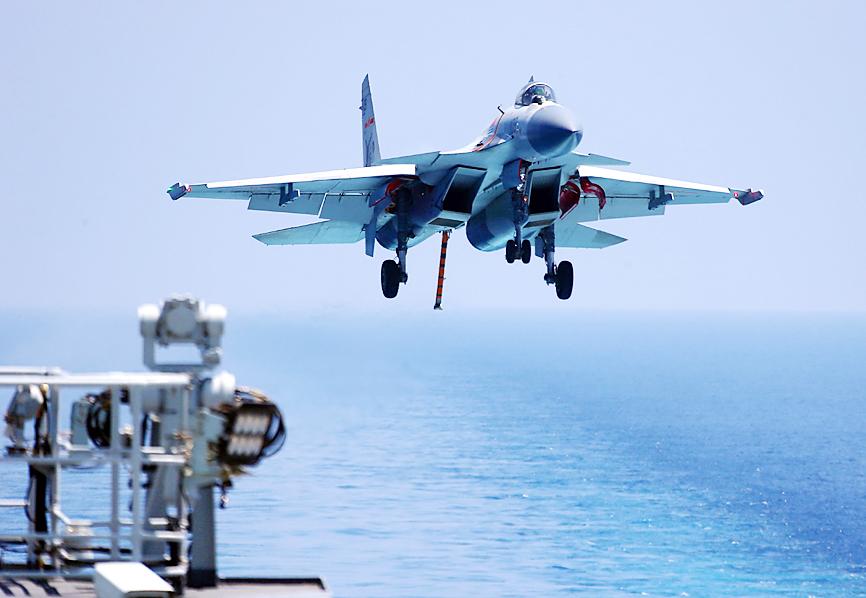Taiwan has laid out plans to challenge what it described as China’s “gray zone threats” to shift the balance of power in the region and possibly take over the nation without fighting a battle.
The Ministry of National Defense yesterday outlined in a biennial military strategy report how it aims to counter what it describes as Beijing’s pressure campaign.
It cited warplane incursions, as well as speedboats ramming its coast guard vessels, and accused China of engaging in “cognitive warfare” to sway Taiwanese public opinion.

Photo: AFP
The military is committed to protecting Taiwan’s sovereignty and democratic system, the ministry said, laying out its strategy for countering China.
“The first and foremost defense undertaking is to prevent war and deter any external military threats, and our overall defense power shall be employed to defend our homeland, magnify the costs and risks entailed by the [People’s Republic of China’s] invasion, and ultimately protect the lives and properties of the people,” it said.
Taiwan has re-emerged as a flash point in US-China ties in the past few months. Washington has been moving to help the government in Taipei take on a bigger role in international organizations like the UN, and US President Joe Biden said last month that the US would come to Taiwan’s aid if it was attacked by China — comments the White House later said did not mark a change in policy.
Yesterday’s report lays out how the military plans to expand the range of its military deterrence to the Chinese coast to create “hostile” embarking and seafaring phases for the Chinese People’s Liberation Army (PLA) forces should they attempt to cross the Taiwan Strait.
“The PLA’s weakness is in the phase of sea transit,” the report said. “The Armed Forces must take full advantage of the natural barrier of the Taiwan Strait and fight in a resilient manner.”
“We should not limit ourselves to waiting for the enemy’s landing groups to sail through the Strait, but should also use measures to force the enemy to assemble forces at airfields or ports further away from areas opposite Taiwan,” it said.
Given China’s overwhelming superiority in terms of personnel and resources, Taiwan plans to utilize asymmetric tactics to nullify the PLA’s advantages, such as countering Chinese airborne operations with mobile surface-to-air missiles and attacking large ships with small, fast and resilient vessels, the report said.
Defensive cruise missiles, and land and sea mines would be key platforms to deter a Chinese attempt to land on Taiwan, it said.
President Tsai Ing-wen (蔡英文) last month told CNN that she was confident the US would come to Taiwan’s defense if China tried to invade, adding that the “threat from China is increasing every day,” while also confirming the presence of some US troops in Taiwan.

A magnitude 7.0 earthquake struck off Yilan at 11:05pm yesterday, the Central Weather Administration (CWA) said. The epicenter was located at sea, about 32.3km east of Yilan County Hall, at a depth of 72.8km, CWA data showed There were no immediate reports of damage. The intensity of the quake, which gauges the actual effect of a seismic event, measured 4 in Yilan County area on Taiwan’s seven-tier intensity scale, the data showed. It measured 4 in other parts of eastern, northern and central Taiwan as well as Tainan, and 3 in Kaohsiung and Pingtung County, and 2 in Lienchiang and Penghu counties and 1

FOREIGN INTERFERENCE: Beijing would likely intensify public opinion warfare in next year’s local elections to prevent Lai from getting re-elected, the ‘Yomiuri Shimbun’ said Internal documents from a Chinese artificial intelligence (AI) company indicated that China has been using the technology to intervene in foreign elections, including propaganda targeting Taiwan’s local elections next year and presidential elections in 2028, a Japanese newspaper reported yesterday. The Institute of National Security of Vanderbilt University obtained nearly 400 pages of documents from GoLaxy, a company with ties to the Chinese government, and found evidence that it had apparently deployed sophisticated, AI-driven propaganda campaigns in Hong Kong and Taiwan to shape public opinion, the Yomiuri Shimbun reported. GoLaxy provides insights, situation analysis and public opinion-shaping technology by conducting network surveillance

‘POLITICAL GAME’: DPP lawmakers said the motion would not meet the legislative threshold needed, and accused the KMT and the TPP of trivializing the Constitution The Legislative Yuan yesterday approved a motion to initiate impeachment proceedings against President William Lai (賴清德), saying he had undermined Taiwan’s constitutional order and democracy. The motion was approved 61-50 by lawmakers from the main opposition Chinese Nationalist Party (KMT) and the smaller Taiwan People’s Party (TPP), who together hold a legislative majority. Under the motion, a roll call vote for impeachment would be held on May 19 next year, after various hearings are held and Lai is given the chance to defend himself. The move came after Lai on Monday last week did not promulgate an amendment passed by the legislature that

Taiwan is gearing up to celebrate the New Year at events across the country, headlined by the annual countdown and Taipei 101 fireworks display at midnight. Many of the events are to be livesteamed online. See below for lineups and links: Taipei Taipei’s New Year’s Party 2026 is to begin at 7pm and run until 1am, with the theme “Sailing to the Future.” South Korean girl group KARA is headlining the concert at Taipei City Hall Plaza, with additional performances by Amber An (安心亞), Nick Chou (周湯豪), hip-hop trio Nine One One (玖壹壹), Bii (畢書盡), girl group Genblue (幻藍小熊) and more. The festivities are to